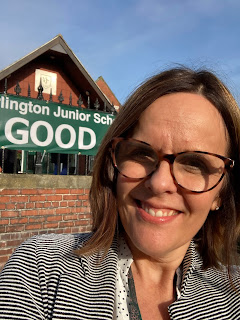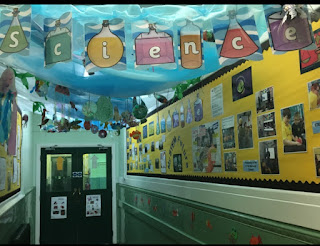Strong Science Deep Dive- OFSTED
Our recent OFSTED Inspection
September 2021 GOOD
Science-Strong
Since I joined our school, our team have been working to get to OFSTED recognised ‘good’. We were due an inspection anytime when Covid19 hit. During lockdown we had an online inspection and subsequently, when we started this academic year in September, we knew a visit was imminent.
OFSTED arrived and as part of their visit we had a Science ‘deep dive’ in the third week of the Autumn term.
I thought I would share some of the key points raised so to give an insight for colleagues/ fellow Science Leads at you head towards inspections in your own educational settings!
I was asked to provide vital documents to the inspectors by 9am on the day, including-
Action plan (we are currently undertaking Primary Science Quality Mark (PSQM) Outreach so this was full of ongoing actions)
Progression document- ours highlights vocabulary, misconceptions, whether the lesson is chemistry, biology or physics based, which enquiry type the lesson is, whether a hands on investigation is taking place, and when data loggers were being used.
Enrichment Plan-visits and visitors
I was given a timetable for the day which included a ‘one to one’ book scrutiny with an inspector and also pupil interviews (with 8 pupils, two from each year group). It was requested that these children should be a combination of children at age related expectation and children of lower ability. The timetable also included lesson observations across school.
We looked at the books together: the inspector was looking for progression across years and differentiation within and across the lessons- and also wanted to ensure we had a strong vision. She asked me about our progression documents- how we decided what investigations were done when and about use of vocabulary. We discussed prior learning- I needed to know about the curriculum across KS1 and KS2. At our school, we have also worked with KS3 so I could comment about transition from Y6 to Y7. We could share a variety of varied work in books including different maths and working scientifically elements required in each year group. We also had examples of scientific literacy and where good scientific texts had been utilised by our pupils.
We talked about what is covered in Science for each year and when. We discussed cross curricular work and how we were ensuring science had a wide and broad base. The inspector checked for continuity across books. She asked me about our identified ways forward- which are always important. I shared our ongoing PSQM Outreach documents which are concise and thorough in this regard. We compared and looked to ensure quality of work, marking and feedback and pupil understanding.
At our school, Enquiry types are indicted with different stickers in books and colour coded on our progression document. We also talked about our Intent, Implementation, Impact document and how we ensure learning is ‘sticky’. During this professional discussion our pre and post assessment and use of Explore, Engage, Extend was shared. We briefly discussed other opportunities our pupils had such as outdoor work with Nature Friendly Schools (NFS) and its important impact on the mental health and well-being of our pupils. Vulnerable children have really benefitted from small group work outside to support their ability to learn in lessons.
We discussed transition links, our STEM/Ogden Trust partnerships and our developing links across the community with other primary schools. We also discussed the schools involvement in SEERIH Progressing/Evolving to be an Engineer.
We talked about how we had rearranged some of the units so to ensure new knowledge would join to previous learning and how long had been the Science Lead. I was asked how we ensured progression, how we ensured no holes in coverage due to Covid and about assessment and monitoring- which had not happened yet within the academic year because we were only three weeks in.
The children were questioned with myself present and then the UKS2 children stayed with the inspector whilst I was asked to leave the room. I later learned that the inspector had asked the pupils about pre-assessment tasks (using EEE) so to ascertain if they were doing what I had outlined- I would assume. Pupils voiced opinions about the enjoyment of science and of a desire to work in a science field when they grow up. She asked how engaged they felt in science, about visits and visitors, about Explorify and Enquiry type stickers in their books.
Next, we observed teachers and children in Science classes across the school year groups- again, myself with an inspector.
We went around school and observed lessons in progress. The inspector spoke to children about their learning and checked for pupil engagement and retention of knowledge. She asked how many SEN children were in the class. I was asked my opinion about what we saw in lessons- which was good/very good. She wanted to check that the hands-on learning they did was relevant and that I kept a check on these plus pre-post assessment. Vocabulary, both Working Scientifically and topic related, was on display throughout school and in books.
I pointed out displays- our science corridor showcases all the STEM work and Environmental work we have done/are doing at Burlington. Our Head has Primary Science Journal articles on display where I have written about varied areas of Science at our school.
I also attended a meeting after the children had gone home with some of the other subject leads. We discussed CPD with staff and how they were supported- they shared their CPD experiences at STEM Learning and within school. The ECT also spoke about support she had received. I tried to comment on anything else at this point which I felt I had not had an opportunity to discuss already such as our Primary Careers Mark accreditation/ careers learning we do at our school plus Maker Education links/work the children are exposed to.
-PSQM Vision and Principles
-School Progression Documents
-Long Term Plan
-Medium Term Planning
-Action Plan (PSQM Action to Reflection Planner)
-Science Intent, Implementation, Impact
-Observations/ feedback/ Learning walks information
-Assessment information
-Ways forward-
-Science Calendar of Events- Subject Development Log (PSQM)
-OFSTED DFE Documents
-Resources- Inventory
-Staff CPD certificates (Reach Out CPD, STEM Learning, Regional SL meetings etc)
-Assemblies- print outs of PP
-Staff meetings and training- information
-Pupil voice- termly records
-Examples of work from across year groups showing differentiation, very good practice and varied enquiry types. A range of ways to represent work- photos, pic-collages, tables, writing, illustrations etc graphs. Excellence through participation opportunities such as Children Challenging Industry, Maker Education activities, GSSfS, SEERIH Progressing/Evolving to be an Engineer
- Examples of pieces I have written-
STEM Learning, Primary Science Journal and Journal of Emergent Science
Case study school- Explorify, Nature Friendly Schools
Royal Academy of Engineering Report,
-Newsletters where Science has featured
-Clubs- information and evidence of work undertaken each year.
The inspectors spoke with our SLT about science being ‘strong’, which I am absolutely thrilled about, although it was not actually mentioned explicitly many times within the actual report.
Quotes from OFSTED Report
I have included those which refer to ‘leaders’ and have relevance to my role and input.
'Leaders encourage good mental health through nurture sessions and a ‘nature’ programme. As a result, pupils have a good knowledge of how to keep physically and mentally healthy'.
'Leaders create a positive environment where pupils flourish'.
'Leaders continue to develop a broad and balanced curriculum that raises pupils’ aspirations. They are keen to ‘sow the seeds of interest’ regarding careers. For example, leaders plan aspects of the science curriculum in order to promote engineering. Leaders develop pupils’ experiences beyond the community'.
'Leaders provide a range of opportunities to develop pupils’ interests. Pupils speak enthusiastically about the range of after-school activities on offer, with one pupil, expressing the views of many, saying, ‘There is something for everyone.’ Clubs range from golfing, cheerleading, football and rugby to mindfulness, yoga and knitting'.
'Leaders are passionate about ensuring that all pupils receive the education they deserve. They have worked hard to improve the education on offer. They are clear about the school’s strengths and the areas that they need to develop. They strive to develop a curriculum that engages and inspires pupils'.
https://reports.ofsted.gov.uk/provider/21/117832
This was a hugely positive visit for Science and for our school and we are all so proud of our hard work over the years to ensure we attained ‘good’. We are all very keen to continue to develop and improve further and are so happy that our school, and the education we provide for our pupils, has been recognised as good.
Thank you for reading. I really hope this benefits you in your role and your school.
Other top tips
We have been learning about live scientists- males and females- and not just dead ones! Fantastic resources for this include ‘Standing on the Shoulders of Giants’ written by Alex Sinclair and ‘Superhero Scientists’ written by David Allen and Alex Sinclair.
Farmer Time has been important for our school and has been ongoing for two years with Farmer Colin!
GSSfS has been happening at our school annually for four years- a fantastic way to connect with other schools locally, nationally and globally.
We have worked so hard to up-level our web site so that it reflects everything going on in school.
Science is everything and we have worked so hard to ensure all pupils have the chance to enhance their transferable skills so to maximise their learning journey and realise their potential and dreams as an adult. Science is everywhere in everyday life- we have worked so hard to ensure this shines through our school and our pupils education.




Comments
Post a Comment